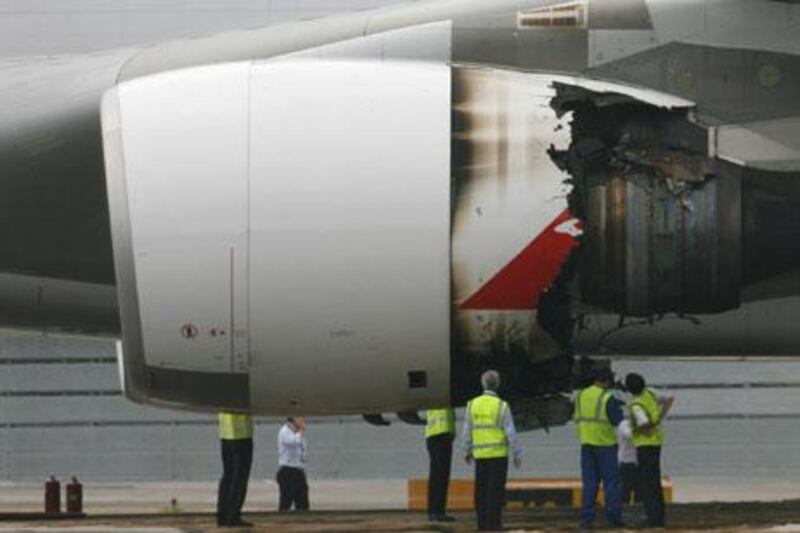A Qantas A380 with more than 450 people on board has made a dramatic forced landing in Singapore, trailing smoke from a blackened engine, after the Airbus superjumbo's first mid-air emergency.
Australia's Qantas Airways, which has never suffered a fatal jet crash in its 90-year history, said it was grounding all six of its A380s following the incident.
Qantas said flight QF32 developed major engine trouble just six minutes into a flight from Singapore to Sydney, and it dumped fuel over Indonesia before returning to Singapore's Changi Airport.
There were no injuries to the 433 passengers or the 26 crew, officials said.
Metal debris including a part bearing the airline's red-and-white "flying kangaroo" emblem slammed into areas of the Indonesian city of Batam, on an island just south of Singapore.
Witness Noor Kanwa described a "loud explosion in the air" and saw "metal shards coming down from the sky".
The Qantas chief executive Alan Joyce said the plane had experienced "a significant engine failure" to one of its four Rolls-Royce Trent 900 jets. The British engine maker pledged to work with Qantas to identify the problem.
"We will suspend those A380 services until we are completely confident that Qantas safety requirements have been met," Joyce told reporters in Sydney.
But the four other airlines that fly the world's largest passenger plane – Singapore Airlines, Air France, Emirates and Lufthansa – all said they had no plans to ground their own fleets.
Airbus, which is betting its future on the commercial viability of the double-decker plane, said the Qantas incident had been "significant" but stressed the A380 was safe to fly on three engines.
"We are not playing down the incident, but it is covered in the certification procedures," a spokesman for the French-based company said, as France's air accident investigation agency launched a probe.
German passenger Ulf Waschbusch said there was a loud boom and flames on the plane's left wing soon after take-off.
"Something ruptured the left wing," Mr Waschbusch, a technology company executive based in Singapore, said after disembarking.
Six fire engines swarmed the A380 on landing, spraying liquid on it, according to an AFP reporter at the Singapore airport.
One of the engines on the plane's left wing was blackened and its rear cowling was missing.
Tyler Wooster, 16, was in the window seat directly over the left wing when the engine emitted "a big gunshot bang".
"I couldn't see, obviously, what happened to the engine beneath, but I saw it shot a big hole through the wing ... and you could see how the wing had peeled off," he told Australia's ABC News.
The plane circled over Indonesian territory for nearly two hours, dumping fuel prior to the emergency landing, Mr Waschbusch said.
"Everyone was surprisingly calm on the plane. We are not going crazy at all," he said. "The crew helped tremendously. I felt in good hands. Qantas did a great job in keeping us safe."
Another witness on the ground in Batam, a 35-year-old driver Ricky, said he heard a "thunderous" sound and saw "three or four pieces of metal" fall into a field.
Qantas shares had been up 10 cents at A$2.97 before erroneous reports that one of its jets had crashed in Indonesia sent them plunging to A$2.82. The stock ended the day up two cents at A$2.89.
After 18 months of production delays caused notably by wiring problems, the A380's first commercial flight, operated by Singapore Airlines, was on the same Singapore-Sydney route in October 2007.
Since the launch, fuel and computer glitches have grounded several A380s and one Air France flight was forced back to New York after problems with its navigation system in November 2009.
In April, a Qantas A380 damaged tyres on landing from Singapore in Sydney, showering sparks and scaring passengers.
A total of 37 A380s are now flying commercially. Another 234 are on order from airlines, according to Airbus, whose US arch-rival Boeing is betting on the smaller 787 Dreamliner as the future of long-haul air travel.
Rolls-Royce has recommended "basic precautionary checks" for the Trent 900 engines. "Since Qantas QF32 suffered an engine failure and returned safely to Singapore Changi Airport we have been working closely with our customer and the authorities," Rolls said in a statement.
It added: "The in-service fleet of Trent 900 engines is small and relatively new, and the group feels that it is prudent to recommend that a number of basic precautionary engine checks are performed. This process is now underway."
* Agencies





